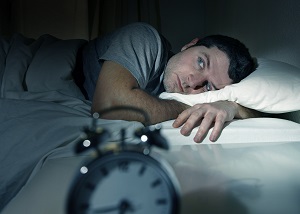Sleep Deprivation Can Affect Your Heart

Sleep deprivation can affect your heart
The cliched, over-used adages about sleeping early might not be something that most people take seriously, but cardiologists and sleep experts swear by them. Doctors say that losing quality and quantity sleep is detrimental to our health. Senior interventional cardiologist, Dr Nilesh Gautam, says, "Sleep disorders cause an increase in blood pressure, heart rate and thyroid hormones, which is indicative of a stress response. This leads to increase heart attack and heart failures." Experts reiterate that people who sleep less than seven hours per day have an increased risk of heart disease, and this is true regardless of other factors that influence heart-health, like age, weight, smoking and exercise habits.
Connect between heart-health and sleep duration
Sleep-deprived people show less variability in their heart rate, state doctors. Dr Gautam explains, "Instead of fluctuating normally, the heart rate usually stays elevated and that is not a good sign. It mimics a situation of heightened stress." Lack of sleep can increase insulin resistance, a risk factor for the development of type 2 diabetes and heart disease.
He adds, "Shortened sleep can increase CRP, or C-reactive protein, which is released during stress and inflammation. If CRP is high, it's a risk factor for cardiovascular and heart disease. Shortened sleep also interferes with appetite regulation. So the individual may end up eating more or consuming food that's unhealthy for the heart."
Sleep disorder and increased risk of heart attack, stroke
Research shows increased incidence of heart attack or stroke linked to sleep deprivation or excess sleep. Cardiac electro physiologist, Dr Santosh Kumar Dora, says, "As per a meta analysis in a European heart journal, short sleepers with less than six hours of sleep run 48 per cent increased risk of coronary artery disease and and 15 per cent of stroke. Similarly, those who sleep more than nine hours have 38 per cent and 65 per cent increased risk of coronary artery disease and stroke respectively." A recent study also has confirmed increased association of heart attack and stroke with sleep deprivation.
Doctors state that short sleepers tend to have faster heart rate and higher blood pressure which expose them to a higher risk of cardiovascular diseases. They tend to have insulin resistance leading to increased incidence of diabetes mellitus. The C-reactive protein, a inflammation marker and risk factor for coronary artery disease, stays elevated in sleep-deprived people. The coronary calcium score is more in short sleepers. All these are considered as risk factors for both heart attack and stroke.
Dr S Ramnathan Iyer, consultant physician and consultant, sleep medicine, says, "Obstructive Sleep Apnoea patients are prone to develop high blood pressure. They are at risk of heart attacks and also type 2 diabetes, stroke, obesity and dementia. In fact, it is advisable to evaluate patients of high blood pressure, angina, heart attack, heart failure for OSA. Management of OSA is highly rewarding since it not only treats the sleep problems but also the associated disorders are better managed. Oxygen is a basic requirement of body cells and if this is lacking, be in sleep only, it needs to be treated."
TIPS TO GET GOOD SLEEP
Here are some important points to keep in mind to avoid heart attacks due to lack of sleep
- Sleep at least six hours at a stretch at night.
- Maintain regular wake and sleep time — sleep at fixed time every night to set the biological clock correctly.
- Go to bed when you are drowsy. Don't enforce sleep.
- Wear loose comfortable clothing when going to bed.
- Use bedroom only for sleep and sex. Do not engage in watching television in the bedroom.
- Take proper medications for blood pressure and blood sugar control.
- Avoid consumption of alcohol or nicotine in any form.
- Yoga, listening to light music and meditation are helpful.
POINTS TO PONDER
- There are more than 70 different sleep disorders, which are generally classified into three categories: lack of sleep (e.g. insomnia), disturbed sleep (e.g. obstructive sleep apnea), and excessive sleep (e.g. narcolepsy).
- It's not completely clear why less sleep is detrimental to heart health, but researchers understand that sleeping too little causes disruptions in underlying health conditions and biological processes like glucose metabolism, blood pressure, and inflammation.
- One study found that over an eight-year period, men with severe sleep apnea were 58 per cent likelier to develop congestive heart failure than men without the night-time breathing disorder. But it doesn't take a severe underlying sleep disorder to see effects on the heart. Poor sleeping (as a result of changing work schedules or poor sleep habits, for example) can put you at risk as well.
- Sleep disturbances need to be evaluated and treated to provide better quality of life and promote health and happiness.
EAT RIGHT
Having a healthy diet and exercising regularly is important. Experts say that eating light food at night before 8 pm is good.
- Avoid coffee or tea after dinner. Avoid nicotine (tobacco) in any form (smoking, tobacco chewing) at night. They hinder sleep as they are alerting agents.
- Do not consume alcohol to induce sleep. Alcohol disturbs sleep and symptoms of OSA become worse.
- Tryptophan, an amino acid, has sleep inducing effects. Carbohydrate foods make tryptophan more available in the brain which promotes sleeps.
- Food that can promote sleep include milk, a carbohydrate rich snack, yogurt, bananas, oats, eggs, peanuts and tuna. Also, herbal tea infused with valerian have been reported to have sedative effects.
Story Credit: http://timesofindia.indiatimes.com/life-style/health-fitness/health-news/sleep-deprivation-can-affect-your-heart/articleshow/58746456.cms


